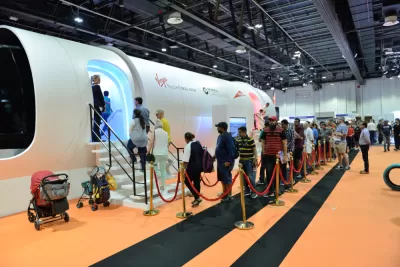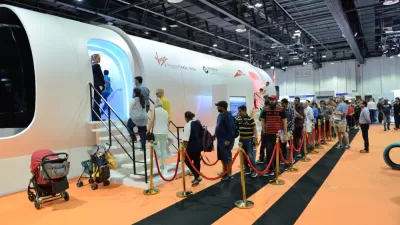The company sees cargo as a more promising and cost-efficient use of its technology.

Virgin Hyperloop is pivoting from moving passengers to transporting cargo and has laid off close to half of its employees, reports James Vincent in The Verge. "A spokesperson for Virgin Hyperloop told the [Financial Times] that the recent cuts would allow the company 'to respond in a more agile and nimble way and in a more cost-efficient manner' and that the decision to lose so many staff at once had not been 'taken lightly.'"
The US-based Virgin Hyperloop is one of the leading firms developing the eponymous technology — an updated version of a centuries-old idea to reduce the energy demands of trains by placing them in vacuum-sealed tubes where air resistance is minimal. The concept was resurrected in 2013 when Elon Musk published a whitepaper on the subject, incorporating magnetic levitation used by bullet trains and bestowing the current branding.
Despite early successes in testing, Vincent notes that Virgin Hyperloop has struggled to attract enough funding and reach additional milestones. "Moving cargo instead of people will simplify safety and regulatory burdens, according to DP World — an Emirati, state-owned logistics group that has a 76 percent stake in Virgin Hyperloop."
FULL STORY: Virgin Hyperloop switches focus from passengers to cargo as it lays off half its staff

Planetizen Federal Action Tracker
A weekly monitor of how Trump’s orders and actions are impacting planners and planning in America.

Restaurant Patios Were a Pandemic Win — Why Were They so Hard to Keep?
Social distancing requirements and changes in travel patterns prompted cities to pilot new uses for street and sidewalk space. Then it got complicated.

Map: Where Senate Republicans Want to Sell Your Public Lands
For public land advocates, the Senate Republicans’ proposal to sell millions of acres of public land in the West is “the biggest fight of their careers.”

Maui's Vacation Rental Debate Turns Ugly
Verbal attacks, misinformation campaigns and fistfights plague a high-stakes debate to convert thousands of vacation rentals into long-term housing.

San Francisco Suspends Traffic Calming Amidst Record Deaths
Citing “a challenging fiscal landscape,” the city will cease the program on the heels of 42 traffic deaths, including 24 pedestrians.

California Homeless Arrests, Citations Spike After Ruling
An investigation reveals that anti-homeless actions increased up to 500% after Grants Pass v. Johnson — even in cities claiming no policy change.
Urban Design for Planners 1: Software Tools
This six-course series explores essential urban design concepts using open source software and equips planners with the tools they need to participate fully in the urban design process.
Planning for Universal Design
Learn the tools for implementing Universal Design in planning regulations.
Heyer Gruel & Associates PA
JM Goldson LLC
Custer County Colorado
City of Camden Redevelopment Agency
City of Astoria
Transportation Research & Education Center (TREC) at Portland State University
Camden Redevelopment Agency
City of Claremont
Municipality of Princeton (NJ)




























